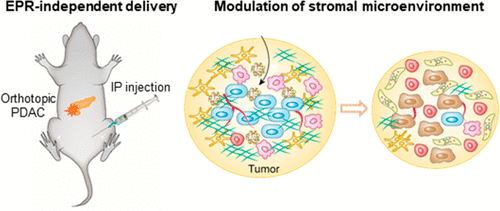Our official English website, www.x-mol.net, welcomes your feedback! (Note: you will need to create a separate account there.)
Stromal Modulation and Treatment of Metastatic Pancreatic Cancer with Local Intraperitoneal Triple miRNA/siRNA Nanotherapy.
ACS Nano ( IF 17.1 ) Pub Date : 2020-01-13 , DOI: 10.1021/acsnano.9b03978 Ying Xie 1 , Yu Hang 1 , Yazhe Wang 1 , Richard Sleightholm 1 , Dipakkumar R Prajapati 2 , Johannes Bader 1, 3 , Ao Yu 1 , Weimin Tang 1 , Lee Jaramillo 1, 4 , Jing Li 1 , Rakesh K Singh 2 , David Oupický 1
ACS Nano ( IF 17.1 ) Pub Date : 2020-01-13 , DOI: 10.1021/acsnano.9b03978 Ying Xie 1 , Yu Hang 1 , Yazhe Wang 1 , Richard Sleightholm 1 , Dipakkumar R Prajapati 2 , Johannes Bader 1, 3 , Ao Yu 1 , Weimin Tang 1 , Lee Jaramillo 1, 4 , Jing Li 1 , Rakesh K Singh 2 , David Oupický 1
Affiliation

|
Nanomedicines achieve tumor-targeted delivery mainly through enhanced permeability and retention (EPR) effect following intravenous (IV) administration. Unfortunately, the EPR effect is severely compromised in pancreatic cancer due to hypovascularity and dense desmoplastic stroma. Intraperitoneal (IP) administration may be an effective EPR-independent local delivery approach to target peritoneal tumors. Besides improved delivery, effective combination delivery strategies are needed to improve pancreatic cancer therapy by targeting both cancer cells and cellular interactions within the tumor stroma. Here, we described simple cholesterol-modified polymeric CXCR4 antagonist (PCX) nanoparticles (to block cancer-stroma interactions) for codelivery of anti-miR-210 (to inactivate stroma-producing pancreatic stellate cells (PSCs)) and siKRASG12D (to kill pancreatic cancer cells). IP administration delivered the nanoparticles to an orthotopic syngeneic pancreatic tumors as a result of preferential localization to the tumors and metastases with disrupted mesothelium and effective tumor penetration. The local IP delivery resulted in nearly 15-fold higher tumor accumulation than delivery by IV injection. Through antagonism of CXCR4 and downregulation of miR-210/KRASG12D, the triple-action nanoparticles favorably modulated desmoplastic tumor microenvironment via inactivating PSCs and promoting the infiltration of cytotoxic T cells. The combined therapy displayed improved therapeutic effect when compared with individual therapies as documented by the delayed tumor growth, depletion of stroma, reduction of immunosuppression, inhibition of metastasis, and prolonged survival. Overall, we present data that a local IP delivery of a miRNA/siRNA combination holds the potential to improve pancreatic cancer therapy.
中文翻译:

用局部腹膜内三重miRNA / siRNA纳米疗法对基质转移进行调节和治疗转移性胰腺癌。
纳米药物主要通过静脉内(IV)给药后增强的通透性和保留(EPR)效应来实现靶向肿瘤的递送。不幸的是,由于血管不足和致密的增生基质,在胰腺癌中EPR作用受到严重损害。腹膜内(IP)给药可能是一种有效的独立于EPR的靶向腹膜肿瘤的局部递送方法。除了改善递送之外,还需要有效的组合递送策略以通过靶向肿瘤基质内的癌细胞和细胞相互作用来改善胰腺癌治疗。这里,我们描述了简单的胆固醇修饰的聚合CXCR4拮抗剂(PCX)纳米粒子(以阻止癌症-基质相互作用),以实现抗miR-210(使基质细胞生成的胰腺星状细胞(PSC)失活)和siKRASG12D(杀死胰腺癌细胞)的代码传递)。由于优先定位到肿瘤和具有破坏的间皮和有效肿瘤穿透力的转移,IP施用将纳米颗粒递送至原位同基因胰腺肿瘤。与静脉注射相比,局部IP递送导致肿瘤积累高出近15倍。通过CXCR4的拮抗作用和miR-210 / KRASG12D的下调,三作用纳米颗粒通过失活PSC并促进细胞毒性T细胞的浸润,有利地调节了增生性肿瘤微环境。与个体疗法相比,联合疗法显示出更好的治疗效果,如肿瘤生长延迟,基质耗竭,免疫抑制降低,转移抑制和延长生存期所证明。总体而言,我们提供的数据表明,miRNA / siRNA组合的局部IP递送具有改善胰腺癌治疗的潜力。
更新日期:2020-01-13
中文翻译:

用局部腹膜内三重miRNA / siRNA纳米疗法对基质转移进行调节和治疗转移性胰腺癌。
纳米药物主要通过静脉内(IV)给药后增强的通透性和保留(EPR)效应来实现靶向肿瘤的递送。不幸的是,由于血管不足和致密的增生基质,在胰腺癌中EPR作用受到严重损害。腹膜内(IP)给药可能是一种有效的独立于EPR的靶向腹膜肿瘤的局部递送方法。除了改善递送之外,还需要有效的组合递送策略以通过靶向肿瘤基质内的癌细胞和细胞相互作用来改善胰腺癌治疗。这里,我们描述了简单的胆固醇修饰的聚合CXCR4拮抗剂(PCX)纳米粒子(以阻止癌症-基质相互作用),以实现抗miR-210(使基质细胞生成的胰腺星状细胞(PSC)失活)和siKRASG12D(杀死胰腺癌细胞)的代码传递)。由于优先定位到肿瘤和具有破坏的间皮和有效肿瘤穿透力的转移,IP施用将纳米颗粒递送至原位同基因胰腺肿瘤。与静脉注射相比,局部IP递送导致肿瘤积累高出近15倍。通过CXCR4的拮抗作用和miR-210 / KRASG12D的下调,三作用纳米颗粒通过失活PSC并促进细胞毒性T细胞的浸润,有利地调节了增生性肿瘤微环境。与个体疗法相比,联合疗法显示出更好的治疗效果,如肿瘤生长延迟,基质耗竭,免疫抑制降低,转移抑制和延长生存期所证明。总体而言,我们提供的数据表明,miRNA / siRNA组合的局部IP递送具有改善胰腺癌治疗的潜力。


























 京公网安备 11010802027423号
京公网安备 11010802027423号